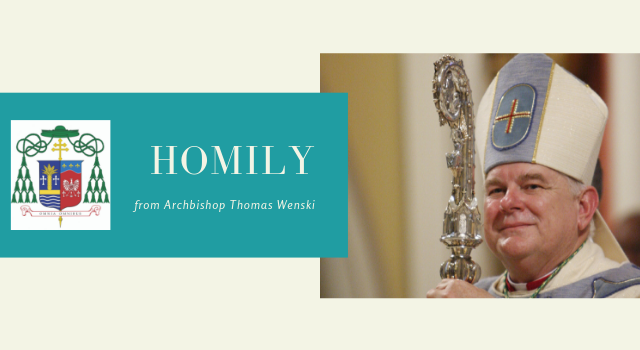By Archbishop Thomas Wenski - The Archdiocese of Miami
Archbishop Thomas Wenski preached this homily during a Mass Oct. 9, 2021, with members of the Catholic Medical Association gathered in Orlando for their annual convention.
This Mass is offered for the repose of the souls of your colleagues who have gone home to the Lord. We pray for them, asking the Lord to bring them to the fullness of Eternal Life — and we pray for you that the Lord will comfort all those who grieve their passing from this life.
In Catholic teaching, death is not the end of human life but a door into Eternal Life. Our funeral liturgy proclaims: “Lord, for your faithful people life is changed, not ended. When the body of our earthly dwelling lies in death, we gain an everlasting dwelling place in heaven.”
God did not make us just to die one day.
That being said, our dying — or the dying of our loved ones — is not an easy experience. Traditional piety has taught us to invoke St. Joseph, foster father of Jesus and husband of Mary, as the patron saint of a “happy death.” And for years, many ended their day by praying: “From a sudden and improvident death, deliver us, O Lord.” Today, I think more people fear not so much a sudden death but a long protracted one.
To pray for our dead — a good and holy thing in itself — is also a lesson in ecclesiology, or in how the Church understands herself. The Church, as the Second Vatican Council reminded us, is essentially a communion: through baptism we enter the very life of God — the Father, Son and Holy Spirit. We become members of one body, the Body of Christ. This is what faith in God, the Father of Jesus, gives us — a family; God is our Father, Jesus our brother, and Mary, our mother.
That communion which is ours in Christ is called in the Creeds: “the communion of saints.” This communion refers to the network of relationships that is rooted in the very life of God: Father, Son and Holy Spirit that draws us together into “one body, one Spirit in Christ.” And that expression is a wonderful way of answering the question, what is the Church? For what is the Church, but the assembly of all the saints, living and dead?
And that communion is only severed by serious sin. Death does not sever our communion with the saints — therefore, tradition has spoken of three states of the Church: the Church triumphant — those of our numbers who have already entered into the glory of everlasting life; the Church suffering — those of the faithful departed who will soon enter heaven but are now experiencing the final purgation or purification that we Catholics call purgatory; and the Church militant, that is those of us who while citizens of heaven through our baptism are still on our pilgrimage on earth, traversing, as it were, alien land until we reach our true fatherland, the kingdom of heaven.
Dying was once viewed as natural and expected. Today, it has become medicalized and unwelcome in medical care. While most people if asked will say they want to die at home in the presence of their family, they end up dying in hospitals. And, as we witnessed far too often during this COVID pandemic, they died alone and separated from their families.
Thank God for advances in palliative care and the hospice movement that has helped us move away from our culture’s denial of death and dying. In the Archdiocese of Miami, Catholic Hospice, a division of our Catholic Health Services, has an average daily census of almost 600 people.
Reflecting on death and dying does not have to be morose — but rather should be hopeful. The Catechism of the Catholic Church teaches: Hope is the theological virtue by which we desire the kingdom of heaven and eternal life as our happiness, placing our trust in Christ’s promises and relying not on our strength, but on the help of the grace of the Holy Spirit. (CCC #1817)
Our belief in purgatory — the final purification of the elect — helps us Catholics to remain firm in that hope, thus avoiding both despair and presumption. Despair is contrary to God’s goodness, to his justice — for the Lord is faithful to his promises — and to his mercy. Because there is a purgatory, we need not despair of our own or our loved ones’ personal salvation if when we die, we still fall short of the perfect holiness required to enter God’s presence. And while guarding us from despair, our belief in purgatory also protects us from falling into presuming that we can save ourselves — without the help of God’s grace — or that we can obtain forgiveness without conversion, or grace without merit. (Cf. CCC #2091, 2092)
Even as we remember to the Lord our departed loved ones, we are reminded of the gift of Eternal Life promised us by Jesus Christ, who in dying destroyed our death and in rising restored us to life.
Jesus suffered death — as each one of us must one day. But Jesus rose from the dead and so death does not have the final word in the history of our human race. As we proclaim in the Apostles’ Creed, we believe in the forgiveness of sins, the resurrection of the body and life everlasting. Amen.

